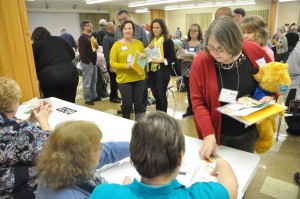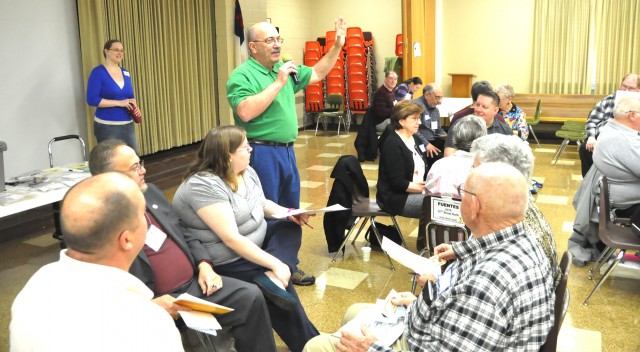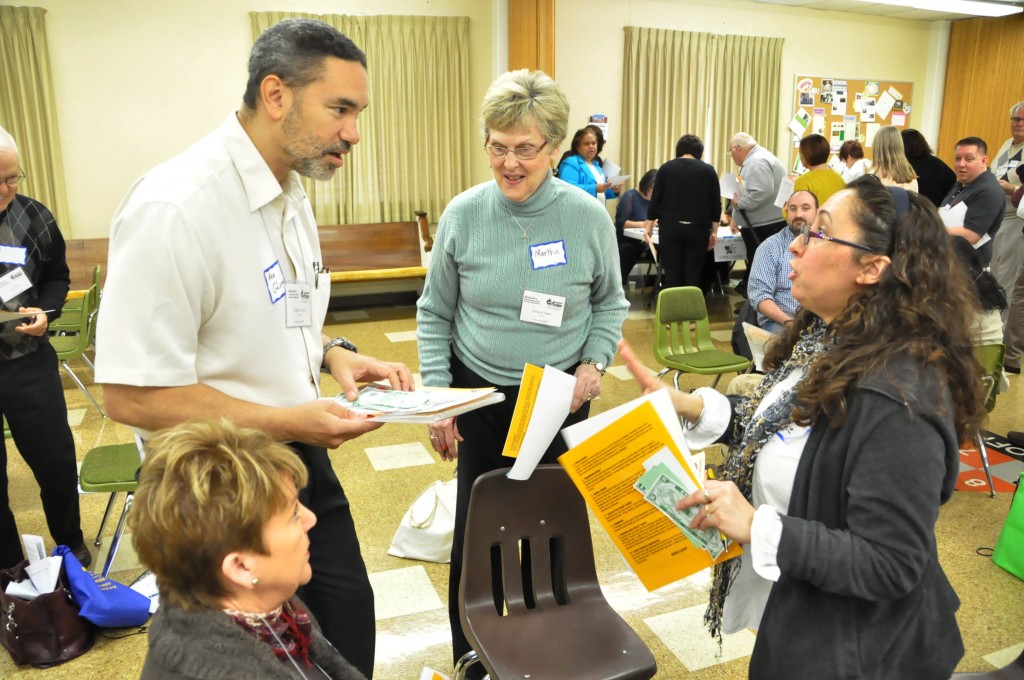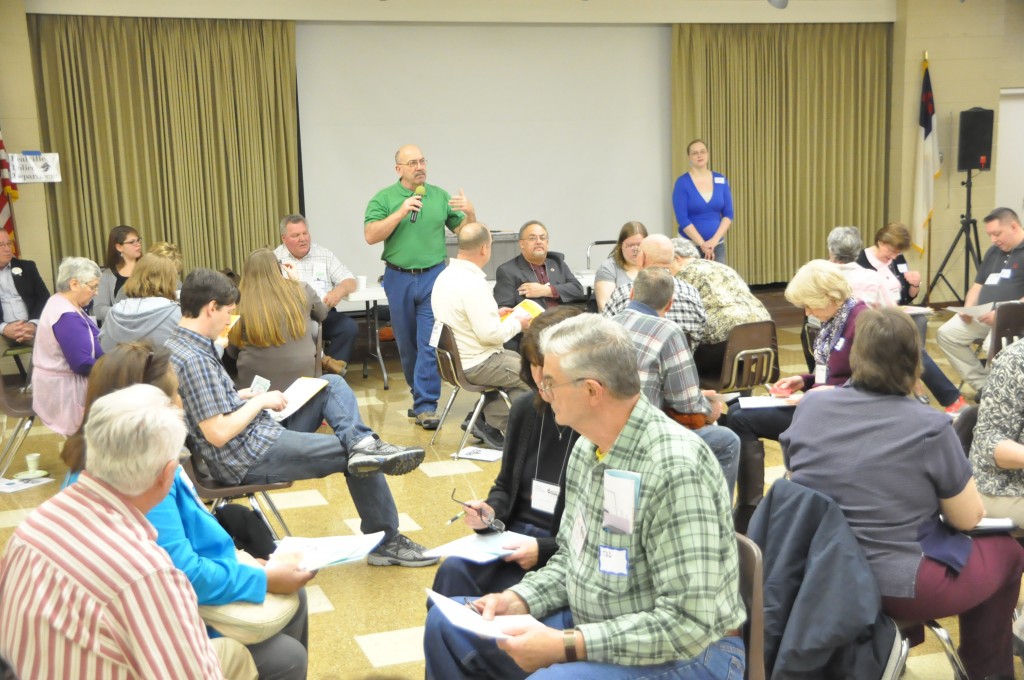Of the more than 100 people who filled the bustling fellowship hall of Grace UMC in Pen Argyl on Saturday, March 12, many were rushing about with nervous tension, getting into long lines, becoming frustrated, trying to be served, trying to get what they needed to survive before time ran out.
 It was a bureaucratic quagmire. It was a hard day’s work that lasted just over an hour. It was… a poverty simulation exercise.
It was a bureaucratic quagmire. It was a hard day’s work that lasted just over an hour. It was… a poverty simulation exercise.
The Eastern PA Conference’s Northeast District put a new spin on its annual Tools for Ministry training for church leaders. Yes, they taught the usual classes for trustees, worship and finance leaders, Staff-Parish Relations Committee members, and adults who work with children and youth. But those were the afternoon classes. The morning session offered something completely different.
Participants–all middle-class Christians–were placed into fictional families and given various roles portraying unfortunate persons who struggle to navigate the vicissitudes of oppressive poverty. After a brief introduction each had to spend one hour simulating one month in the life of an impoverished family, based on written family profiles that outlined their economic circumstances.
Each 15 minutes represented a week, with time-outs for new instructions. With minimal information, they had to wander and often rush about to tables around the room–some manned by unfriendly personnel–seeking to obtain needed social services, including housing, employment, transportation, food, education and public assistance to deal with various crises.
They had to see what it felt like trying to survive when ends don’t meet, and thereby gain insight into the stress that is part of the experience of daily poverty.
“This simulation is an invaluable tool to help middle-class folks grasp the plight of their neighbors who are struggling in the cycle of poverty,” explained facilitator Arthur Piancone, who directs Bridges Out of Poverty for the Pocono Alliance, a local human services provider. Helping him were graduates of the Alliance’s next-level program, Getting Ahead, which provides resources, training and networking to help people escape poverty. Some of them have earned college degrees, found jobs, bought homes and reunited their families, thanks to the program.
“Poor people have lots of questions with no answers—where to go, who to see, what to do,” said Piancone, describing the anxious need for immediate solutions as “the tyranny of the moment.” He said 97 percent of the people Bridges serves are women, mostly single moms. “They deal with a daily insufficiency and a lack of support systems many of us enjoy. We try to introduce people to what that feels like.”
In a later debriefing session some participants shared their surprise at how critical public transportation is. Or how quickly they learned to lie or hide information about having a job or child care when desperately seeking help from social services—something Piancone blamed on “the system’s manipulation” and its requirements to get help. Others were easily cheated because they didn’t count the money or tickets they received, but just accepted what they were given by impatient, dismissive caseworkers. One participant called the exercise “excellent,” adding, “I grew up poor; so I recognized a lot of what I saw here.”
Single mothers trying to get out of poverty may need a social safety net for up to seven years to break free from public assistance, explained Piancone. That’s partly because of the system’s rules, like cutting benefits once a single mother gets a job, which can leave her making less money after paying for child care and transportation. He named four causes of poverty:
- Individual behaviors
- Political systems and structures, including changes in laws and policies
- Exploitation, fraud and manipulation from various sources, including predatory loans
- A lack of community resources, which Bridges tries to address in its programs.
“Trying to get resources needed to survive can be a full-time job that requires planning and organizational skills many don’t have,” said the Rev. Candy LaBar, pastor of Faith UMC in Stroudsburg, who arranged for the simulation. “It can take up your whole day and use up all your energy.” Piancone is a member of her church, which hosts Wednesday night Getting Ahead classes from October through February, a ministry begun by Faith’s previous pastor, the Rev. Amy Banka.
LaBar was profoundly moved and enlightened by her first poverty simulation experience several years ago. (Read LaBar’s devotional, “Understanding Poverty,” which she offered before the simulation began.)
“People here realized, as I did, how broken the system is,” she said. “We didn’t tell them what to expect or how it would feel, but you could hear them reflecting on it in their conversations.”
LaBar and her planning team were unsure if people might object and not attend a Tools for Ministry focused almost totally on poverty. Even the afternoon leadership classes addressed their topics in the context of ministry with the poor, one of the four mission foci of the denomination. But the people came in droves to experience the unexpected.
“A poverty simulation is not like sitting through a seminar and safely absorbing information,” said LaBar, when interviewed afterward. “You have to take risks and be willing to try something new, to step out of your comfort zone and open yourself to some insights that maybe you weren’t ready to have. It takes courage to really participate. I’m sure some people will go home tired today.”
Despite the stress, the simulation drew laughter at times from some, no doubt because it wasn’t real. But Piancone would remind them that poverty is a real experience for far too many people. “It’s important for people to have fun and enjoy themselves,” said LaBar. “but still to understand the seriousness of this life, that there are many people who won’t get to eat for the third weekend in a row unless they can find a food pantry open.”
“This has been a gift to all of us,” said the Rev. Irving Cotto, Northeast District Superintendent, who described the exercise as fun but uncomfortable at times. “We’ve been blessed in so many ways as middle-class families. We need to be aware and responsive to what we’ve learned here. I pray we can put into action many of the thoughts, feelings and concerns that came to us.”
“For all the good we do with our soup kitchen and other services,” said the Rev. Jim Todd, pastor of East Stroudsburg UMC, who wants to bring a poverty simulation exercise to his church, “it’s the systemic reasons for poverty that we need to address to really make a difference in people’s lives.”
By John W.Coleman
Eastern PA Conference Communications Director
Main photo: The Pocono Alliance’s Arthur Piancone instructs participants in the Northeast District’s poverty simulation exercise, as the Rev. Candy LaBar observes from the back. (John Coleman photos)



